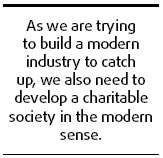Answering call of charity
Both human casualties and economic losses from natural disasters have been tremendous this year. But the benevolence individuals and social organizations have displayed through donations and voluntary service has been even greater.
No wonder that an official from the Ministry of Civil Affairs was quoted as saying yesterday that the country's commitment to charity had been advanced by at least 10 years by the donations and what the volunteers had done during the devastating May earthquake.
Statistics show that the country's total amount of donation to charity was 10 billion yuan ($1.45 billion) in 2006 and the figure rose to 30.9 billion yuan in 2007. This year the donations for earthquake relief alone reached 60 billion yuan and the total amount was more than 100 billion.
Against this backdrop, the three-day national charity conference that opened yesterday in Beijing is of particular significance to the future of the country's dedication to charity.
Ancient Chinese sage Confucius said: "Treat the parents of others the way you treat your own and love the children of others the way you love your own."
This idea has been the theoretical foundation of charity in China.

It was quite common in ancient times for the wealthy people to open their barns for starving residents or provide them free congee in time of famines or other natural disasters.
So charity has always been part of the country's tradition.
But we do fall behind Western countries in terms of modern charity as we did in modern industry. As we are trying to build a modern industry to catch up, we also need to develop a charitable society in the modern sense.
China has had more and more millionaires and billionaires in the past three decades. But many of them were accused of not contributing enough to charitable causes or to set up charitable foundations.
We may not have a desirable incentive mechanism to encourage them to donate. But a more important reason is that many of the new rich have yet to learn to practice the virtue of philanthropy.
Even after the rapid increase in donations this year following the earthquake, the 100 billion yuan makes up only 0.4 percent of the country's GDP. In the US, donations to charity comprise 1.85 percent of the GDP.
What is encouraging is the fact that many wage earners have contributed their share to the 100 billion yuan. And of course so have many entrepreneurs and social celebrities.
The number of volunteers who either rushed to the quake-affected areas to join rescue work or helped in other ways had amounted to 3 million, an unprecedented event in modern Chinese history.
The message is clear: An increasing number of relatively better-off Chinese residents have started to realize that the care and love they show to others are important not only to those who receive them, but to themselves.
This really is the biggest hope that the numbers bring.
(China Daily 12/05/2008 page8)














